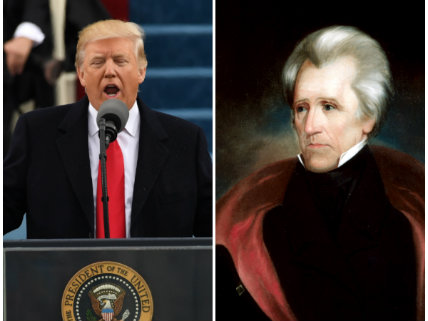Here's What Trump Can Learn From Andrew Jackson's First Inaugural Address
Trump's inner circle has embraced the comparison to Jackson, America's first populist president, so he better get to work on the national debt.

Donald Trump's rise from political outsider to President of the United States, carried by a populist uprising against the ruling class, has drawn comparisons to Andrew Jackson, America's first populist president.
Commentators and historians alike have noted the similarities between Trump and Jackson, and Trump's inner circle seems to have embraced Jackson as something of a role model. Steve Bannon, Trump's senior counselor, told The Hollywood Reporter that he sees Jackson's presidency as guide for how to "build an entirely new political movement."
Trump's inaugural address on Friday was an extension of his populist campaign, and, intentionally or not, reflected Jackson's first inaugural address from 188 years ago. Both promised to reform the federal government, expand national infrastructure, and provide for a more robust military.
When he took the oath of office and delivered his first inaugural, Jackson claimed that his victory was a "demonstration of public sentiment" calling for reforms to "the patronage of the Federal Government," which Jackson said, "have placed or continued power in unfaithful or incompetent hands."
Sound familiar? On Friday, Trump promised that his administration would transfer power back to the people. "A small group in our nation's capital has reaped the rewards of government while the people have borne the cost," he said. "Washington flourished, but the people did not share in its wealth."
Times have changed since 1829, of course. Jackson stepped into White House as the leader of a nation that barely stretched west of the Mississippi River and still allowed human beings to be kept as property. Trump is the leader of a global superpower with a whole different set of problems.
The major difference between the two, at least in terms of how they rose to the presidency, is that Jackson lost his first bid for the White House in 1824—in what's certainly the most controversial election in U.S. history; one that makes Bush V. Gore look tame by comparison—before winning four years later.
Still, the similarities abound. Jackson, like Trump, was a political novice when he ran for president and was very much outside the political establishment of the day. Like Trump, he campaigned against that establishment and had the good fortune of doing so at a moment in history when existing political alliance and battle-lines were being redrawn.
Against those fracturing political alliances, Jackson's name-recognition and fame (he had been a general during the War of 1812 and was hailed as a hero of that conflict's Battle of New Orleans) helped him stand out—in much the same way that Trump used his own name-recognition and fame to rise to the top of a deeply divided Republican Party.
On Friday, Trump bemoaned the loss of "trillions of dollars" rebuilding infrastructure in foreign countries and called for building of "new roads and highways and bridges and airports and tunnels and railways all across our wonderful nation." Jackson, too, promised the then-expanding United States a program of "internal improvement and the diffusion of knowledge, so far as they can be promoted by the constitutional acts of the federal government."
Likewise, on foreign policy, Trump's promise to "seek friendship and goodwill with the nations of the world, but we do so with the understanding that it is the right of all nations to put their own interests first," echoes Jackson. "With foreign nations it will be my study to preserve peace and to cultivate friendship on fair and honorable terms," the seventh president, presiding over a pre-superpower America, said. Perhaps a bit of that 19th century humility would be a good thing for America's foreign policy two centuries later.
Yet, if Trump sees himself as something of a modern day Jacksonian figure (and he has the hair for it, if nothing else), then there are other lessons for Trump to take from Jackson's first inaugural.
For starters, Trump could embrace the long-lost notion that the federal government should largely leave the states to their own devices—and here's some ideas for how he could do that—which Jackson supported. "I hope to be animated by a proper respect for those sovereign members of our Union, taking care not to confound the powers they have reserved to themselves," Jackson said, nodding to the U.S. Constitution's Tenth Amendment.
Those ideas were completely missing from Trump's inaugural—and from the campaign that preceded it. Sure, Trump said he wanted to give power back to the people, but the rest of his speech was a long list of ways he would use the power of the federal government to achieve various things.
If Trump really wants to live up to the Jacksonian mantle, his biggest challenged will undoubtedly be the federal debt—now approaching $20 trillion. Jackson, who spent much of his eight year in office trying to kill one of the nation's first experiments with central banking, had no love for the idea of a national credit card.
In his first inaugural, Jackson promised to spend a considerably share of his time on "management of the public revenue," the strict control of which was essential for a well-function economy, in his mind.
"This I shall aim at the more anxiously both because it will facilitate the extinguishment of the national debt, the unnecessary duration of which is incompatible with real independence, and because it will counteract that tendency to public and private profligacy which a profuse expenditure of money by the Government is but too apt to engender," Jackson said.
Trump made no mention of the national debt on Friday. He did not say anything about reducing the deficit or of the dangers of profuse expenditures, either. There are some encouraging reports that the Trump administration wants to cut some federal spending, but he's got a long way to go.
Show Comments (185)